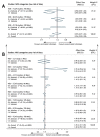Can Vaccination Trigger Autoimmune Disorders? A Meta-Analysis
- PMID: 34451946
- PMCID: PMC8402438
- DOI: 10.3390/vaccines9080821
Can Vaccination Trigger Autoimmune Disorders? A Meta-Analysis
Abstract
Vaccination as an important tool in the fight against infections has been suggested as a possible trigger of autoimmunity over the last decades. To confirm or refute this assumption, a Meta-analysis of Autoimmune Disorders Association With Immunization (MADAWI) was conducted. Included in the meta-analysis were a total of 144 studies published in 1968-2019 that were available in six databases and identified by an extensive literature search conducted on 30 November 2019. The risk of bias classification of the studies was performed using the Newcastle-Ottawa Quality Assessment Scale. The strength of evidence was assessed using the Grading of Recommendations Assessment, Development, and Evaluation. While our primary analysis was conducted in terms of measures of association employed in studies with a low risk of bias, the robustness of the MADAWI outcome was tested using measures independent of each study risk of bias. Additionally, subgroup analyses were performed to determine the stability of the outcome. The pooled association of 0.99 (95% confidence interval, 0.97-1.02), based on a total of 364 published estimates, confirmed an equivalent occurrence of autoimmune disorders in vaccinated and unvaccinated persons. The same level of association reported by studies independently of the risk of bias was supported by a sufficient number of studies, and no serious limitation, inconsistency, indirectness, imprecision, and publication bias. A sensitivity analysis did not reveal any discrepancy in the primary result. Current common vaccination is not the cause of any of the examined autoimmune disorders in the medium and long terms.
Keywords: immunization; meta-analysis; vaccine safety; vaccine-associated autoimmune disease.
Conflict of interest statement
Marek Petráš, Ivana Králová Lesná, Jana Dáňová, and Alexander M. Čelko have no conflict of interest to declare. The funder had no role in the design of the study; in the collection, analyses, or interpretation of data; in the writing of the manuscript; and in the decision to publish the results.
Figures


References
-
- Lerner A., Jeremias P., Matthias T. The world incidence and prevalence of autoimmune diseases is increasing. Int. J. Celiac. Dis. 2015;3:151–155. doi: 10.12691/ijcd-3-4-8. - DOI
Publication types
Grants and funding
LinkOut - more resources
Full Text Sources

